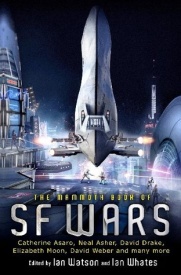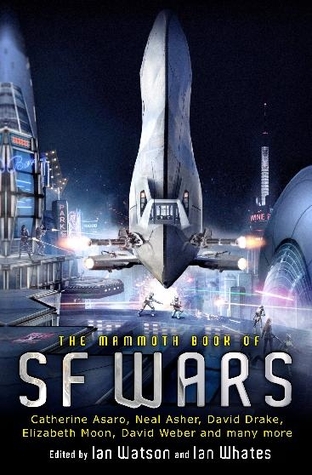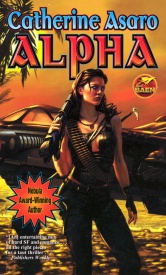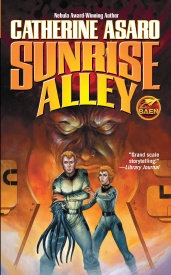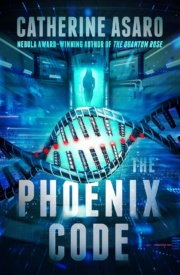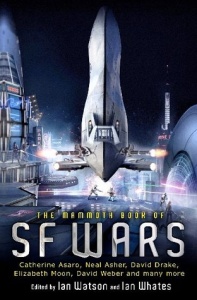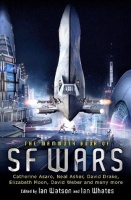The Mammoth Book of SF Wars
Part of the Stand Alone Stories
What will the future be like?
We think of ourselves as intelligent, but the ability to make war evolved with us from the dawn of civilization. Is violence an innate part of being human? This provocative collection explores how wars and their aftermath might progress with us into the future. From terrorism to armored death machines, from small and bitter skirmishes to vast conflicts that sweep across the stars, from the brutal to the subtle—venture with our authors into the electrifying reaches of the Mammoth Book of SF Wars.
“The Pyre of a New Day”—Catherine Asaro
“The Rhine’s World Incident”—Neal Asher
“Caught in the Crossfire”—David Drake
“Politics”—Elizabeth Moon
“The Traitor”—David Weber
And many more!
Start Reading
The Mammoth Book of SF Wars
Excerpt
Jump to Ordering Options ↓
THE PYRE OF NEW DAY
A novelette by Catherine Asaro
Hypron opened his eyes into the darkness and sensed emptiness. The house was too quiet. He called out to his brother. “Oxim? Are you there?”
Silence. Usually by this time, his brother was in the living room, listening to reports from the mainland areas of the colony.
“Lumos on,” Hypron said.
The room remained dark. That surprised him less then the silence; the Evolving Intelligence, or EI, that ran the house had failed months ago. The backup systems worked, but they weren’t reliable. He wanted to believe that was why he heard nothing from the other room, but the silence was in his mind as well, and that shook him, for he always sensed his brother’s moods if the two of them weren’t separated by too much distance.
Hypron slid to a small table by the bed and brushed a panel there, trying to toggle on the lumos. Nothing. The room stayed dark. With care, he eased off the bed, intending to sit on the floor, but he slipped and fell onto the ground with a thud, groaning as pain shot up his calves. At least he could still feel his legs. The sensation in them would probablygo next.
Rolling onto his stomach was easy; after that, matters became more complicated. He braced his elbows on the floor and pulled his legs under him, but when he tried to kneel, his legs gave way and he pitched forward onto his stomach. With a grimace, he pushed up on his elbows and crawled across the floor, using his arms, dragging his legs.
The entire time, he kept searching for Oxim with his mind. He felt nothing, which meant his brother was either asleep or far away. Surely Oxim wouldn’t come home without letting Hypron know he was back safely. Perhaps he had just fallen asleep on the sofa. Nearly a day had passed since their last full meal, and hunger gnawed at them both. Oxim had gone to find supplies, searching for an outpost or any place where survivors still lived out here. The mud-sloop didn’t have enough fuel to travel any great distance, which meant if Oxim had ventured too far, he might be stranded and unable to return home.
When Hypron reached the bedroom door, he sat against it, catching his breath. Then he grabbed one of the bars he and Oxim had installed on the wall and pulled himself to his feet. Leaning against the door, he used it for the support his withered legs could no longer provide. Unbidden, memories came to him of when he had been healthy, when he could stride, run, jump, full of vigor. He pushed away the images, hiding them in recesses of his mind where they wouldn’t hurt so much. As he slid open the door, he hung onto it so he could stay upright. Outside, he made his way along the hallway using bars hammered into the walls, dragging his legs along. Despite the cool air, he was sweating by the time he reached the front room where he and his brother often sat in the evening, watching the holo-vid, reading, talking.
It was dark.
“Oxim, are you here?” he asked. “Did you fall asleep?”
No answer. No snores or grunts. Nothing.
He slid his hand across the wall until he found the control panel for the EI. He scraped at it, tapped the surface, banged it with his fist, all to no avail.
“House, answer!” Hypron said.
Silence.
He edged forward—and stumbled on some object. With a curse, he felltohis knees. Grabbing at whatever had tripped him, he caught a wheel of the mobile recliner he had built. It must have rolled out of its usual place when the house shifted on its floating supports. He pushed it against the wall and slid into its seat, his legs stretched in front of him, his arms draped over the armrests, his palms flat on the cool floor. The velvety darkness surrounded him with a quietude that could have comforted had he felt secure, but that offered only fear now, as he worried about Oxim.
He rolled the recliner across the room. Ifheopenedtheoutsidedoor, thebluemoons would flood him with their cool light, and he could see if anything was out there. Or anyone. He easily reached the door, a crude airlock, little more than a double panel withalayerofairbetween. When he pushed its autolock, nothing happened. He tried the safetyrelease, whichwassupposedto work even if the power failed, but it was either jammed or broken, because the door refused to budge.
Hypron exhaled in frustration. Maybe his brother couldn’t get inside. With neither their house nor their personal comms working, Oxim had no way to contact him. They had also lost contact with the mainland when their neutrino transmitter failed. Hypron could fix it if they located replacement parts, but whatever remained of the colonial authority had stranded them out here with little recourse. They had never had many neighbors this far from the mainland, and only a few had survived the civil war that had devastated the colony. Even more colonists had died in the aftermath of the war, when mud-pirates took to the seas and looted the drifting homesteads.
Although Oxim would never talk about it, Hypron knew his brother had killed to defend their home. Oxim had always been the protector, and when Hypron’s health had failed, a neurological disease that took more from him every year, Oxim had become caretaker as well. Without that lifeline, Hypron would have died on this godforsaken mudball of a world.
Oxim, where are you? Closing his eyes, Hypron let his thoughts spread outward, searching. Oxim was like everyone else; he didn’t feel the ebb and flow of other people’s moods. The rest of humanity inhabited a barren land where people knew only their own emotions. Hypron had starved his entire life for the touch of another other mind like his, but Oxim came closer to understanding than anyone else. His mind was strong and deep, a bedrock to Hypron’s mercurial moods.
For so long it had been just the two of them. Their parents had died in a mining accident when Oxim had been fifteen and Hypron eight. Oxim had gone to work in an ore refinery on the asteroid where they lived, but he insisted Hypron stay in school. At age fifteen, Hypron had joined him on the job, both of them saving their pay, day by day, year by year, until finally they had enough to escape the planetoid. Six years ago, on Hypron’s twenty-third birthday, they had signed up as colonists for this world called New Day. So they had come here, full of optimism, to a colony that promised a sunrise in their lives. They had dreamed of so much: their own algae farm, air they could breathe, warm days, all those luxuries they had never known.
Sunrise. Right. He gritted his teeth and banished the memories, trying to clear his mind. Gradually his mood calmed and his thoughts expanded like ripples in a lake. On the edges of his awareness, far distant, he caught a mental warmth. Oxim? He tried to focus, but the sense drifted away from him.
Hypron wasn’t certain how long he searched, but eventually he had to let go. He sagged in his chair, exhausted. His health had deteriorated until just this much effort wore him out. He would rest a bit and then see if he could fix the generator and open the door. The air still smelled fresh, and he was warm, so the house hadn’t completely failed. After so many years of living on the edge of survival, he had learned a great deal about coping with faulty systems.
The darkness pressed in on him. It was lonely. Well, hell, he should be used to it. He had hoped to find a wife here, but he’d never had much luck, even in the beginning, when he had been healthy. He could meet women; they found him pleasant enough to look at. But they always ended up saying he was impractical, moody, unreliable. It wasn’t that he minded work. He could toil for hours and never know time was passing. But the farm he and Oxim had started here, growing crust-algae in slop-flats, bored him mindless, and he came home every day stinking of sweat and mud. If he’d been a woman, he wouldn’t have wanted to marry him, either. He’d joked that way once with a girl he liked, but instead of laughing, she had stared as if he were an idiot. So much for his sparkling humor.
Oxim claimed Hypron was out of his element, that he was an artist, a dreamer full of imagination. He swore Hypron just needed an outlet for his creativity. Hypron didn’t see it. He wished he could be like the other colonists, satisfied with New Day. Except instead of a new life, they had come to failure. So many had died. And each time another colonist passed away, the survivors mourned, until it scarred Hypron’s mind, for he couldn’t turn off the grief, neither for himself nor for what he feltfromothersaround him.
A thought came to him. Oxim’s filter mask might have clogged. It was unlikely; Oxim hadn’t been outside long enough, and he always took a spare. But the worry lodged in Hypron’s mind. If his brother was unconscious, put out by the noxious atmosphere, that could explain why his mind felt distant.
Hypron felt along the wall to the storage niche at waist height. He pulled out a filter mask and fastened the mesh over his mouth and nose, then crumpled a spare mask into his pocket. He had two options to open the door: repair the generator and return power, or break down the door and do repairs later. He knew from experience that even if he managed to fix the generator without replacement parts, it might take hours. If he could break the door, it would probably be a lot faster. Once he found Oxim, they could live in a back room until they fixed both the door and generator. They had equipped every room here with air filtration systems after the atmosphere of New Day had degraded so much, they couldn’t breathe it for morethananhour. Thathadbeen two years ago. These days, they couldn’t take it for more than fifteen minutes. If Oxim was trapped out there with a faulty mask, he needed help now, not in a few hours.
Steeling himself, Hypron grabbed a bar on the wall and yanked, twisting at the same time, trying to wrench it free. He kept at it, pulling and twisting, until sweat soaked his shirt.
With a screech, the bar tore away from the wall, and the momentum of his yank sent the recliner rolling backward as the bar thumped into his lap. With a grunt, he stopped the rolling chair with his hands and pushed it back to the door. Then he hefted up the bar and swung it at the airlock, and again, and again, hammering the recalcitrant barrier.
When the strained composite of the door finally buckled and collapsed, it sounded as if the house were groaning. Wet, warm air hit Hypron’s face. Even wearing his mask, he couldn’t escape the stench, and bile rose in his throat from the stink of fetid mud. Blue light poured across him, limning jagged pieces of the door that jutted up from the ground. The larger moon was full and overhead. Bathed in its eerie light, a pier stretched in front of him from the doorway to a dock. Hypron inched his recliner out onto the pier, using his hands to clear a path as best he could. The mud-sea swelled around the house, endless, its fluorescent sea-mats glinting with iridescent specks like small islands in the vast, dark expanse.
As Hypron rolled forward, the pier swayed, its stabilizers as compromised as the rest of the house. Mud slopped over its sides and across his hands, oozing between his fingers, coating his skin, thick and granular with the remains of dead lobsterites no bigger than the tip of his finger. His palms scraped the rough pier as his hands slid through the gunk. The recliner had good traction, but in this mess, he could slide into the mud-sea, which teemed with fish-snakes that grew bigger every year. Then what? He doubted he could pull himself back onto the pier. He grimaced and tried to stop thinking.
As he neared the dock, a shadow at its end resolved into the sloop docked at the boathouse. It meant Oxim had returned. The big seine net was attached to the pier to snag the smaller, edible eels, so Oxim must have disembarked from the ship. If he had collapsed out here with a faulty mask, gods only knew how sick he might be by now.
The dock shook as Hypron rolled onto it, and mud squirted between its uneven boards, slowing the recliner. He forced his way onward, his biceps straining. The sloop was pulling on its tether, swaying in the lethargic waves—
Hypron hit a barrier. He stopped, peering into the blue-tinged night. A ridge stretched in front of him, a few handspans high. He felt along it…uneven and soft, like a bulky sack…
A body.
Suddenly he couldn’t breathe. He struggled to draw in air and gagged on the rancid smell. Bracing himself, he searched the body until he found the neck. His fingertips scraped the bumps of a raised tattoo there. An ID mark. Imperial Space Command, or ISC, provided one for every colonist, a means to identify anyone.
Anyone.
“Oxim!” Hypron shook his brother. “Oximsonner! Wake up!” He fumbled with Oxim’s mask, looking for the toggles that would tell him how badly it had failed. They were smooth on a working mask, but became progressively rougher as the gunk that saturated the atmosphere clogged the filter.
The toggles felt as smooth as a burnished coin.
“Oxim,” he whispered. “Answer me.” He pulled up the sleeves of his brother’s jacket to take his pulse.
Nothing.
No. No. This couldn’t be. It couldn’t. Yet he didn’t sense his brother’s mind even here, right next to him. Clenching Oxim’s bicep, he planted his other hand on the pier and strained to push the recliner backward, bringing his brother with him. He just barely moved the body. Taking a ragged breath, he tried again and pulled Oxim another handspan.
Bit by excruciating bit, Hypron dragged his brother home. He struggled to ignore the stiffness of Oxim’s muscles. Rigor mortis his mind screamed, and he refused to acknowledge it, as if that could undo this agony. But nothing could change the truth, that mud-pirates prowled out here, using weapons they had looted from ruins of the colony. They killed the owners of homesteads and looted the remains with impunity. No one went after them, no retribution even from the supposedly oh-so-formidable ISC. No one gave a flaming damn about this world that was tearing itself apart while its desperate colonists killed one another.
Hypron didn’t realize he had reached the house until he rammed backward into the doorframe. He choked in a breath. Only a little farther. He strained to pull Oxim’s body over the broken remains of the entrance, and debris ripped his skin. Mud seeped into his bleeding cuts, probably infecting him with gods only knew what. He didn’t care. He would rather die than leave Oxim to rot out in this miserable night.
Finally they were inside. Like a pressure valve that suddenly released, knowledge burst within him. Oxim was dead. Dead. The one constant in his world, the one person who cared whether he existed, the one person he loved, was gone.
He had no food. He had no way to contact anyone. He couldn’t pilot the mud-sloop alone. He had used all his resources except one—the projectile pistol. He could make his death quick instead of long and gruesome from starvation and exposure.
Hypron cradled Oxim in his arms, his head bent over his brother’s body while he cried.
***
“This planet is disgusting,”Soz Valdoria said.
She stood at the prow of the mud-racer while the ship cut through the viscous glop of a sea. Gunk splattered her uniform, the black knee-boots, leather pants, and vest. It left dark blotches on the two gold armbands around each of her leanly muscled biceps, the sign of her rank as a Jagernaut Secondary in Imperial Space Command.
The sea ahead roiled and churned. An enraged creature once again lifted out of it, a snake-like monster with green eyes and a body armored in purple and silver scales. The part of its neck that showed above the mud reached to four times Soz’s height and twice as thick as her body. Fangs ringed its huge mouth. It reared above the ship, whipping back and forth while it screamed its challenge at her.
“Just a little closer, you ugly reject from hell,” she told the monster. “Come on, babe.”
Yells were coming from behind Soz, someone shouting at her to go below the deck, but she ignored them. This critter had pissed her off.
Its teeth glinted as its maw gaped above her, ready to snap her in two. Soz raised her jumbler, a mammoth black gun that glittered in the watery sunlight of this ridiculously named planet, New Day. She waited until she had a clear shot straight down the snake’s throat.
She fired.
The jumbler shot sub-electronic particles known as abitons, often called wimpons because of their low energy. They annihilated bitons, making flashes of orange light. In the air, it only created only a few sparkles—but when the beam hit the serpent, its head disintegrated in a dramatic burst of light. The beheaded neck snapped wildly over the boat. If the racer hadn’t been marginally intelligent, the spasming monster would have shattered the ship’s mast. As it was, the pole barely managed to bend aside in time to avoid being smashed.
With a final whip of its body, the headless serpent slammed into the mud and vanished below the surface. Black waves leapt abovetheboatandrainedsludgeover the deck and Soz.
“Gods,” she muttered. This planet deserved to be shoved into a black hole.
“Are you out of your flaming mind!” someone shouted behind her.
Now that the commotion was dying down, Soz turned around. Dale Yaetes, the racer’s captain, was standing there, soaked in mud, staring as if she had grown a second head. Rex Blackstone was leaning his towering, bulky self against a strut of the ship not far away, his brawny arms crossed, his Jagernaut uniform covered with mud. Yaetes was wearing a silver filter mask that covered his nose and mouth, but neither Soz nor Rexneededone; theirphysical augmentations included filters in their respiratory tracts that could deal with the atmosphere for short periods. As usual, Rex looked intimidating. But Soz felt his mood. He was struggling not to laugh. Honestly. She ought to throw him in the brig. Except their starfighters didn’t have brigs, lucky man.
“I don’t think I was ever in my mind,” she told Yaetes. “So I suppose I’m out of it.”
“You can’t do that!” He waved at the revolting sea, which was still sloshing around. “Those serpents kill anything that threatens them.”
“Didn’t kill me.” Soz hefted her gun, which unfortunately was drenched in mud. She’d have to take it apart to clean it properly. Damn. Dismantling a miniature particle accelerator was no small task.
“It wanted to eat her,” Rex said. “The poor thing.”
She glowered at him. “And you just stood there?” In truth, she knew Rex had her back. He had in all the years they had flown together in a Jag squad, from the days when they had been cadets at the Academy untilnow, whenshecommandedthe squadand he served as her second.
Rex grinned at her. “I felt sorry for the critter, the way it was so outmatched.”
“Colonel Valdoria,” Yaetes said. “If you decide to kill every creature that looks at us cross-eyed, we’ll never get the colonists evacuated.”
He had a point. Monsters infested this planet. She couldn’t get rid of them all, besides which, destroying the mutated wildlife here wouldn’t help what remained of the colonists. This world was too far gone.
“We’ll set up a base as soon as we find a suitable location,” she said. Then she added, “I’m a Secondary, Captain. The rank is roughly equivalent to colonel, but not the same.”
“Ah. Yes. Of course.” He looked as flustered now as he had yesterday when her squad had arrived with the rest of the ISC forces to help the beleaguered colony. He didn’t shield his mind well; she could tell he thought she looked too young for a colonel. Actually, he thought she looked like a sex goddess from an erotic holovid. What a bizarre thought. Some of his images were vivid enough that she picked them up even with her own mind fortified by mental barriers. No way could she contort her body into those positions. She wondered if he realized Jagernauts were psions. They had to be, given that they linked mentally to their ships. She hadn’t said anything because he was a good officer who genuinely wanted to help these people, and he’d be mortified if he knew she had picked up his, um, creative imagination.
Rex walked forward with that easy gait of his, his jumbler holstered at his hip. Soz nodded to him, and he nodded back, acknowledging her thanks for his backup. Yaetes watched as if he were observing the tribal rites of some dangerous alien race. Soz supposed he had reason. ISC classified Jagernauts as a different species from Homo sapiensbecause they were human weapons with biomech systems in their bodies that let them think, move, and react faster and with more strength than normal humans. Soz thought it was absurd to call them another species, given that Jagernauts and humans could interbreed just fine. But regardless of how ISC labeled them, their function remained the same. Kill.
Well, not always. Sometimes they ended up on missions like this one, cleaning up ISC messes. Not that ISC would admit they had screwed up royally here on New-drilling-Day. The terraforming had become unstable, turning the supposed paradise into crud. Another few decades and the planet would be uninhabitable. Her squad had come with a recovery team assigned to help the colonists. Not many remained; most of those who had survived the miserable environment had killed each other off in a vicious civil war that erupted over the shortage of supplies and livable habitats.
Soz wanted to throttle someone. This should never have happened. What the blazes had been going on at HQ? Oh, she knew. Politics. She hated politics. ISC was in bed with the Newland Corporation that had bought and terraformed this world. Corporate hadn’t wanted to admit to such a spectacular failure because it would bankrupt them. So they pretended it didn’t happen, giving the colonists stupid assurances they would fix everything even while they scrambled to cut their losses. It had taken a special commission determined to investigate rumors of the growing death toll to blow apart the scandal. Damn it, ISC should have paid more attention.
A ways behind Captain Yaetes, the hatch to the below-decks compartments opened, and a lanky woman with short yellow hair climbed out into the sticky wind, her face protected by one of the silvery masks.
Who is that? Soz thought.
Jen Foley, the navigator,the node implanted in her spine thought. It communicated by firing bio-electrodes in her neurons, which she experienced as thoughts.
Foley. Soz committed it to memory. She was still learning names of the crew Yaetes had brought onboard today. She felt the navigator’s mood. Foley was more disturbed by the mud than the sea serpent. That was all Soz could tell, though; like most people, Foley instinctively raised natural barriers to protect her mind. Soz had them as well, but hers were more sophisticated, for she had trained for decades to use her mental abilities. Regardless of how shaken the navigator felt, she came forward with a steady walk, which Soz respected.
“All secure below,” Foley said as she joined them.
“You all right?” Captain Yaetes asked her.
“I’ll live.” Foley grimaced. “I’m not so sure about the racer. It’s thick with mud, including the engines. You hear how labored they sound? If they stall, we can use sails to travel, but I don’t like to depend on them. We need to dock and clean the engines.”
Yaetes looked out at the sea stretching in every direction. “Dock where?”
Foley pointed southeast. “Satellite maps say an island is a few hours that way.”
Soz’s expertise was starships not water ships, but she could hear the uneven chugging of the engines. They should be cleaned now, not in a few hours. Surely they could find something closer. Locating the smallest settlements was a bit dicey because the atmosphere interfered with their sensors, all those particulates that saturated the air, a plethora of bacteria and microscopic insectoids. She could ask the flagship in orbit to step up their search, but Soz had an idea that could work faster and wouldn’t draw resources away from other rescue operations. Closing her eyes, she eased down her mental shields. Her awareness spread out, across the mud ocean with its teeming, putrid life. Nothing…
Wait. A golden, clean warmth glowed amid the mess of New Day. Where—?
She opened her eyes. Rex had a glazed look very different from his usual laser-focus. His gaze met hers.
You catch that? Soz asked.
Something, he thought. I’m not sure what. But strong.
As Soz nodded, pain jabbed her temples. She raised her barriers again, protecting her mind, and lifted her arm, pointing northwest. “We go there,” she told Yaetes and Foley.
“Nothing is out that way,” Foley said. “Just mud, mud, and oh gosh, more freaking mud.”
Soz smiled. She could get to like this Foley person. “It looks that way. But something is close by. If we find even a small outpost, we can commandeer it and set up a base. And you can clean your engines.”
Yaetes shook his head. “I’m no military officer, just a merchant serving what’s left of our outliers. So maybe I’m not used to ISC lingo. But what will you commandeer? Most likely all we’ll find are dead people and shattered dreams.”
Soz spoke quietly. “We’ll use respect, Captain.”
“If you’re wrong about its location,” he said, “we’ll be even farther from help.”
“I’m sure it’s there,” Soz said. Why, she couldn’t have said. But she had no doubt.
***
The door of the house was broken, the place had no power, and mud caked the living room. Soz wondered what had happened. It must have been recent; the mud was relatively fresh, if anything that disagreeable could be called “fresh.”
She stood in the doorway of the damaged house and looked outside, checking the area. The sun glowed like a white-hot rivet overhead, and green-tinged clouds scudded across the dusky blue sky. She wondered who at the Newland Corporation had come up with the whacked idea of telling the settlers that the greencamefrom chlorophyll. The colonists had scientists. They knew it was a lie. Every year more toxic compounds formed on New Day, including traces of green chlorine gas. It wasn’t much, and most gathered in low areas rather than high in the atmosphere, but it took very little to poison humans and it could cause violent reactions. That was only one of thousands of problems here.
While Rex and the crew carried in equipment from the racer, Soz checked the house. The crew could bivouac in the living room. She needed a separate area for a command center to coordinate the rescue efforts for this area. They hadn’t found this homestead in time, but they might be able to help other survivors out here.
How had it unraveled so badly on this world? She meant to find answers, and she didn’t care whose politics she ruffled. So fine, she was no diplomat. But the people had come here with such dreams, and they deserved so much more than what NewlandCorporationhad handed them.
Foley came over to her. “We found a room for your office.”
“Good.” Soz could tell Foley was upset, but not why. “What’s wrong?”
The navigator took a breath. “There are dead people in there.”
Damn. She was too late to do them any good. “Show me.”
Foley took her to a bedroom. It had a desk, a recliner on wheels, a bed, a mesh table with a glossy tech surface that had gone dark—and two bodies on the flex-metal floor. The men were of average height and similar age, possibly twins, one of them thinner than the other. Dried, caked mud covered them both.
Doctor Carlon, the racer’s medic, was kneeling by the thinner man. Looking up, he pushed a lock of tousled red hair out of his eyes. “This man is alive.”
end of excerpt
The Mammoth Book of SF Wars
is available in the following formats:
